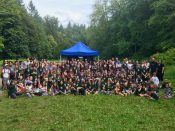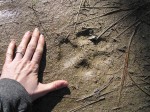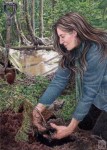In celebration of Black History Month 2022, we encourage everyone to see the new film “Who We Are” releasing nationwide in theaters this month including live in-person Q&As with creator Jeffrey Robinson at the SIFF Uptown Cinema in Seattle! We participated in a Who We Are seminar last February and his creation is exactly what’s needed this month, because Black Lives Matter. We also stand with Brown & Asian citizens and immigrants, and we are grateful to be here on land and waters of the Puyallup, Nisqually, Muckleshoot & Snoqualmie.
 End-of-Day Camp Photo from August, 2019 standing near a site known to be the location a Snoqualmie longhouse before settlers likely burned it in the late 20th century. We were inspired to start Wolf Camp in the land and waters of the Chippewa (Anishanabe) Nation, got our start among the Lummi, Nooksack, Skagit and Salish, enjoyed years of private and pristine land, water and resources of Tulalip area tribes along the Snohomish & Skykomish rivers, and currently live and operate Wolf Camp in the territories of the Puyallup, Nisqually, Muckleshoot & Snoqualmie people. We are grateful to say the least.
End-of-Day Camp Photo from August, 2019 standing near a site known to be the location a Snoqualmie longhouse before settlers likely burned it in the late 20th century. We were inspired to start Wolf Camp in the land and waters of the Chippewa (Anishanabe) Nation, got our start among the Lummi, Nooksack, Skagit and Salish, enjoyed years of private and pristine land, water and resources of Tulalip area tribes along the Snohomish & Skykomish rivers, and currently live and operate Wolf Camp in the territories of the Puyallup, Nisqually, Muckleshoot & Snoqualmie people. We are grateful to say the least.
We were closed over the weekend of June 12-14, 2020 in honor of the call by Seattle – King County BLACK LIVES MATTER for a statewide strike and day(s) of action, as well as June 19-21 in honor of Juneteenth. The strike request was, and still is, to contact your mayor, city council, county executive, county council, county prosecutor and state reps/senator asking for real accountability in law enforcement (police, sheriff, state patrol, etc) and dismantling structural racism built into our institutions. Please ask, again and again, if your city, county, state has institute 8cantwait demands yet, and other systemic changes such as wikipedia.org/wiki/Movement_for_Black_Lives thank you!
Before turning our attention back to our yearly 24/7 effort of running summer camps, we spent the last two weeks of May 2020 and first half of June addressing systemic racism in our community, and continued in the fall lobbying our city to create a Racial Diversity & Equity Commission, among other work. Our own business contributes to the racial inequity problem in many ways. We think every year about implementing a staff-and-student recruiting process focused on communities of color, but we probably only do a couple days of work on it each year. We did achieve gender equity some years ago, but still have a majority white staff, as well as tuition for most programs that’s out of reach for most people without scholarships.
The entire outdoor education and recreation industry is faced with fundamental structural problems that need to change before achieving real Diversity, Inclusion, Equity & Justice (DEIJ). For instance, a fundamental problem in our case as a for-profit business, are having no funding sources besides the tuition we charge. It’s the fundamental flaw of capitalism that needs to be balanced with proper governance. Recognizing this several years ago, we made a multi-year effort to transition Wolf Camp over to our non-profit Conservation College to bring us in the direction of serving historically disenfranchised communities. Sadly, the transition did not succeed before we had to put the transition “on hold” at the start of the pandemic era.
On a similar note, a key issue that our very specialized “earth skills” field of study also needs to address is cultural appropriation of indigenous knowledge. We have always been uncomfortable with the marketing tactics and mimicry of indigenous knowledge used by other schools, despite awkward attempts to cite sources and permissions to share. We have committed oversights ourselves, especially in the early years of our school, but we always strove to accept feedback and change. From the start, we tried to mitigate the dilemma by never charging enrolled tribal members, although tribal programs have nevertheless been extremely generous in their financial support and encouragement. Each year, we re-assess how much of what we teach and share is appropriate, and how much we need to give back to the original people of the lands and waters where we learn and operate.
For the time being, we will continue to operate Wolf Camp as ethically as a small business can in this system, and in the meantime, work to further diversify our staff and students. We are doing outreach to communities of color in an effort to bring new instructors-in-training to our camp community, and promoting our programs to families who would not normally be able to access Wolf Camp in the affluent park areas we often operate.
That’s another structural problem we face: the extreme level of class/wealth disparity in King County, juxtaposed with the location of the Hans Jensen Group Camp which is nearly the only place in the Seattle metro area we are really free to teach the high level of skill we want to give. On one hand, Hans Jensen has allowed me and Kim to finally make a living after almost 20 years doing this, and we have realized my dream to bring a high percentage of Asian & Asian-American participation into camps – something I hoped would help inspire environmental education in places like China.
Similar to what Jon Stewart experienced, we would attract the traditional intern who, in taking 3 months off paid work, very likely comes from a high socio-economic background, so our flow of employees rose out of that population. Stewart’s best solution was paying interns, opening real opportunity to a wide array of people. He also moved beyond hiring the lone woman, then the lone black person, to realizing that not coming from a diverse background himself, he needed someone with that quality in the top leadership position. As a result, he chose Trevor Noah as his replacement: multiracial, worldly, in poverty for much of his childhood, from a country where he helped overcome personal and political resistance to DEIJ.
- One, that’s what the United States itself will achieve in a few short years from now.
- Two, in a majority white area, achieving 50/50 on staff is important because that’s one of the critical steps to making all people feel truly included/welcome/at home in an organization or program. Statistically, not everyone can do that, but we will.
- Three, it’s also critical to bring balance to the extremely unbalanced field of outdoor education and recreation. Our ultimate goal is to bring the wilderness and outdoors to people who were marginalized from it over the past century. Go for a hike, paddle, or mountain bike ride in the popular North Cascades area adjacent to the Seattle-Tacoma metro area. Who do you see? More importantly, who is missing? That glaring answer is what needs attention.







